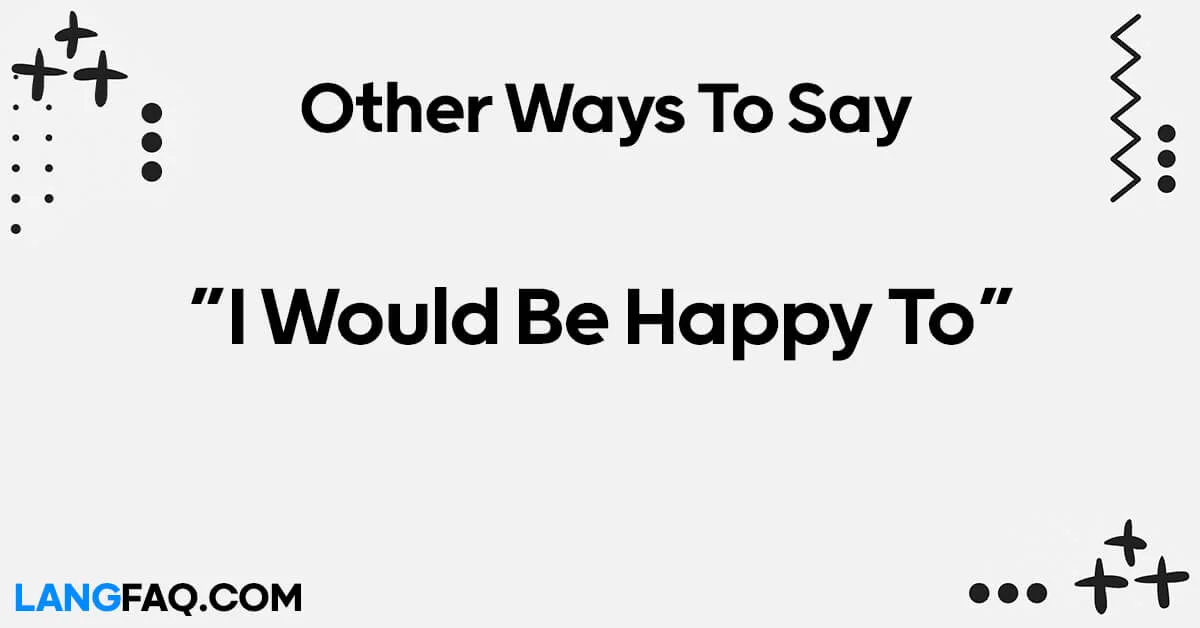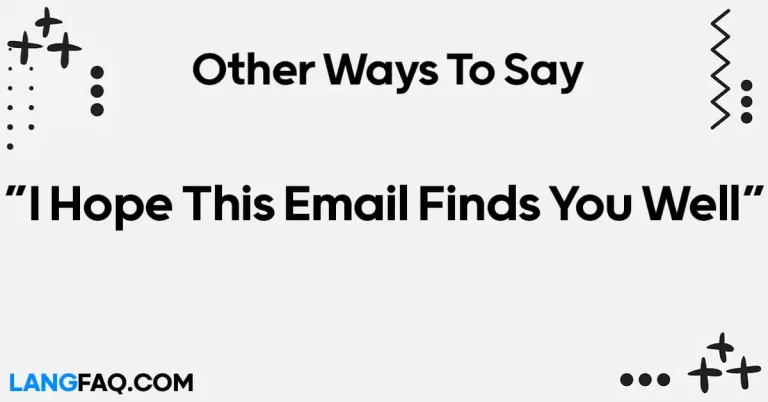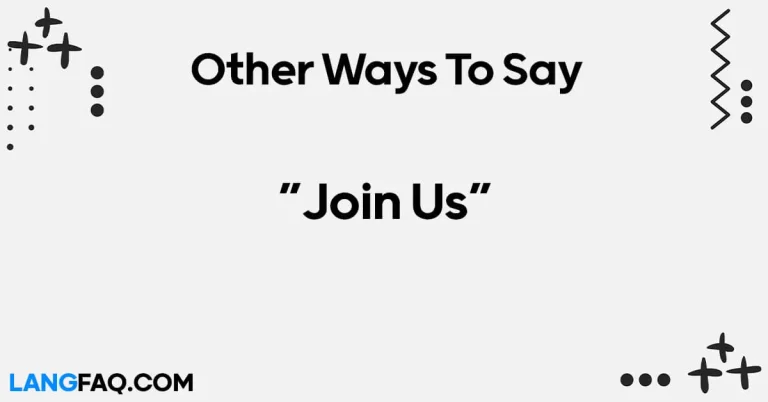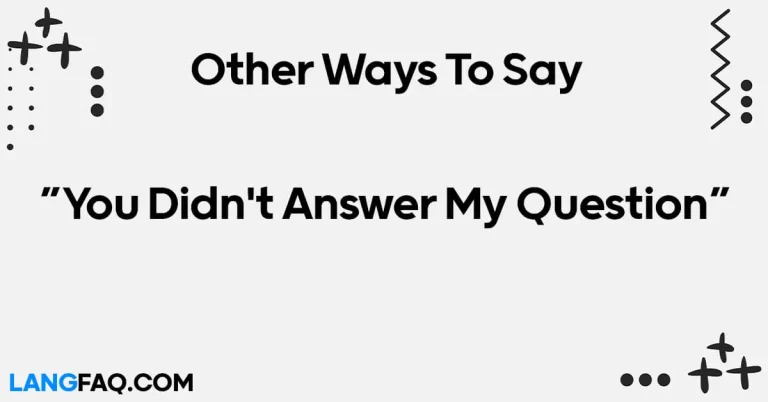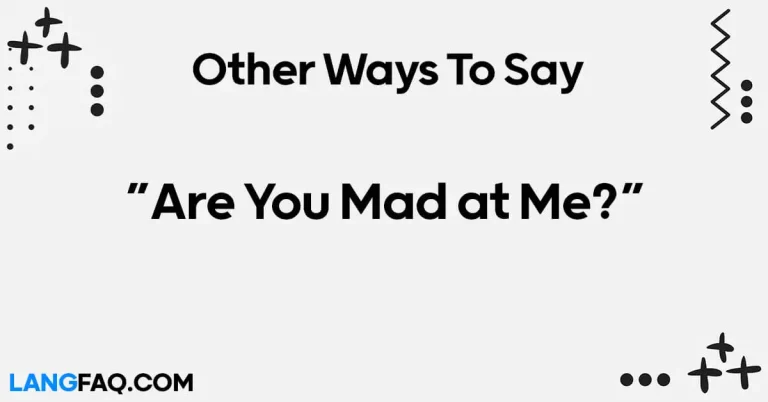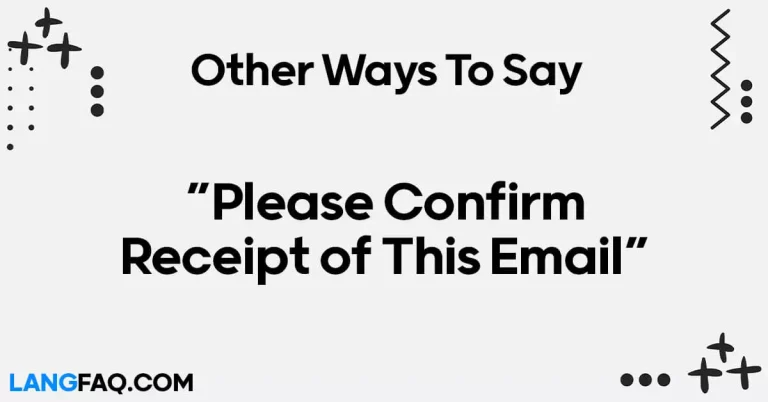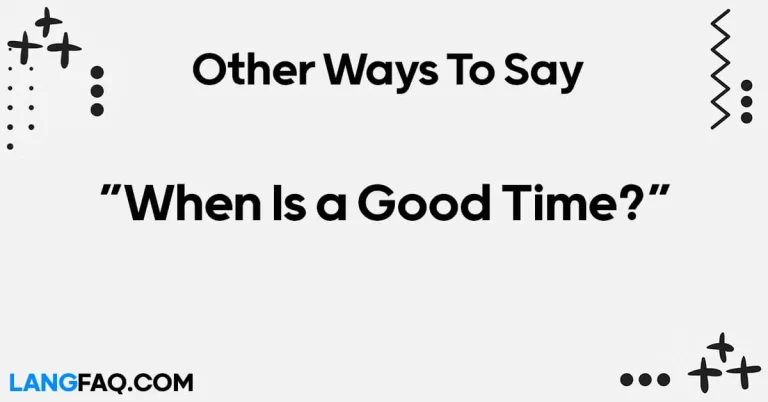Enhancing your communication skills can significantly impact your personal and professional life. One way to do so is by expanding your vocabulary with alternative expressions for commonly used phrases. In this article, we’ll explore 12 other ways to say “I would be happy to,” providing you with versatile options to express willingness, enthusiasm, and eagerness in various contexts. Whether you’re in a formal business setting or having a casual conversation, these alternatives will help you convey your intentions effectively and leave a lasting impression.
12 Other Ways to Say “I Would Be Happy To”
Here are 12 other ways to say “I would be happy to”:
- I’d be delighted to
- I’d be pleased to
- I’d be glad to
- I’d be honored to
- I’d be more than happy to
- I’d be thrilled to
- I’d be ecstatic to
- I’d be overjoyed to
- I’d be eager to
- I’d be keen to
- I’d be enthusiastic to
- I’d be excited to
| Alternative Expression | Meaning | Example |
|---|---|---|
| I’d be delighted to | Expressing sincere pleasure and willingness | “I’d be delighted to help you with your project.” |
| I’d be pleased to | Conveying satisfaction and readiness | “I’d be pleased to assist in any way I can.” |
| I’d be glad to | Indicating happiness and willingness | “I’d be glad to attend the meeting.” |
| I’d be honored to | Showing respect and eagerness | “I’d be honored to be part of the team.” |
| I’d be more than happy to | Emphasizing extreme willingness | “I’d be more than happy to lend a hand.” |
| I’d be thrilled to | Expressing excitement and eagerness | “I’d be thrilled to join the event.” |
| I’d be ecstatic to | Conveying intense joy and readiness | “I’d be ecstatic to help you celebrate.” |
| I’d be overjoyed to | Indicating extreme happiness and eagerness | “I’d be overjoyed to support your cause.” |
| I’d be eager to | Showing keenness and readiness | “I’d be eager to assist with the project.” |
| I’d be keen to | Expressing strong interest and readiness | “I’d be keen to learn more about the opportunity.” |
| I’d be enthusiastic to | Conveying excitement and readiness | “I’d be enthusiastic to collaborate with you.” |
| I’d be excited to | Indicating anticipation and eagerness | “I’d be excited to explore new possibilities.” |
Expanding your vocabulary to include these alternative expressions for “I would be happy to” allows for more nuanced and expressive communication, enhancing your ability to convey willingness, enthusiasm, and readiness in various situations. Whether in professional or personal contexts, utilizing these alternatives can enrich your interactions and strengthen your relationships with others.
Is It Correct to Say “I Would Be Happy To”?
Yes, “I would be happy to” is a correct and commonly used phrase in English. It is a polite and courteous way to express willingness or agreement to do something. This phrase conveys a sense of readiness and positivity in offering assistance or participating in an activity. It is often used in both formal and informal contexts to convey a willingness to help or accommodate someone’s request. Overall, “I would be happy to” is a polite and friendly expression that effectively communicates a positive attitude towards fulfilling a request or offering assistance.
Professional Mail Example With “I Would Be Happy To”
Subject: Assistance with Project Proposal
Dear [Recipient’s Name],
I hope this email finds you well. I wanted to extend my gratitude for considering me as a potential collaborator on the upcoming project proposal.
Having reviewed the details you provided, I would be happy to offer my expertise and support to help bring this project to fruition. I believe my experience in [relevant field or skill] aligns well with the objectives outlined, and I am eager to contribute to its success.
Please feel free to share any additional information or specific tasks you would like me to assist with. I am flexible and committed to ensuring that we meet our goals effectively and efficiently.
Looking forward to the opportunity to work together and achieve great results. Please let me know how I can best support the project moving forward.
Thank you once again for considering me for this collaboration.
Best regards, [Your Name]
I’d be Delighted to
Expressing sincere pleasure and willingness, “I’d be delighted to” is a versatile phrase suitable for both formal and informal contexts. When offering assistance, this phrase conveys genuine enthusiasm and eagerness to help, leaving a positive impression on the recipient.
Usage and Scenarios:
- Formal Context: In a professional email, you can use “I’d be delighted to” to respond to a request for assistance or collaboration. For example, “I’d be delighted to provide further information about our services.”
- Informal Context: When a friend asks for a favor, respond with “I’d be delighted to” to express willingness and happiness in helping them out.
Example Sentence:
“I’d be delighted to meet with you to discuss the project further.”
Email Sample:
Subject: Re: Collaboration Opportunity Hi [Recipient’s Name],
Thank you for reaching out! I’d be delighted to explore potential collaboration opportunities with you. Let’s schedule a meeting to discuss further.
Looking forward to connecting soon.
Best regards, [Your Name]
Variations:
- Colleague: “I’d be delighted to assist you with the presentation.”
- Friend: “I’d be delighted to join you for dinner tonight.”
- Mentor-Mentee: “I’d be delighted to offer guidance on your career development.”
Dictionary Insights:
According to the Cambridge Dictionary, “delighted” means feeling or showing great pleasure or satisfaction. It conveys a sense of genuine happiness and enthusiasm in offering assistance.
Tips:
- Use “I’d be delighted to” when you genuinely feel excited and pleased about helping someone.
- Maintain a friendly and positive tone when using this phrase to enhance its effectiveness.
Conclusion:
“I’d be delighted to” is a delightful way to express willingness and enthusiasm in various situations, whether professional or personal. By incorporating this phrase into your communication, you can convey sincerity and eagerness to assist, fostering positive relationships and interactions.
I’d be Pleased to
Conveying satisfaction and readiness, “I’d be pleased to” is a courteous and polite way to express willingness to assist or participate. It communicates a sense of contentment and eagerness to help, making it suitable for both formal and informal interactions.
Usage and Scenarios:
- Formal Context: Use “I’d be pleased to” in professional settings such as business meetings or networking events to offer assistance or support. For instance, “I’d be pleased to provide feedback on your proposal.”
- Informal Context: When a neighbor asks for help with a task, respond with “I’d be pleased to” to convey readiness and willingness to lend a hand.
Example Sentence:
“I’d be pleased to join the team for the upcoming project.”
Email Sample:
Subject: Re: Assistance Needed
Hi [Recipient’s Name],
Thank you for reaching out! I’d be pleased to assist you with the task. Please let me know how I can help.
Best regards, [Your Name]
Variations:
- Colleague: “I’d be pleased to collaborate on this project with you.”
- Friend: “I’d be pleased to help you move into your new apartment.”
- Mentor-Mentee: “I’d be pleased to provide guidance on your research project.”
Dictionary Insights:
According to the Cambridge Dictionary, “pleased” means feeling happy or satisfied about something. Using “I’d be pleased to” conveys a sense of satisfaction and willingness to assist.
Tips:
- Maintain a professional demeanor when using “I’d be pleased to” in formal contexts.
- Follow up promptly after expressing willingness to ensure effective communication.
Conclusion:
“I’d be pleased to” offers a polite and courteous way to express willingness and satisfaction in assisting others. Whether in professional or personal settings, using this phrase can convey readiness and eagerness to help, fostering positive relationships and effective communication.
I’d be Glad to
Indicating happiness and willingness, “I’d be glad to” is a warm and friendly way to express readiness to assist or participate. It conveys a sense of happiness and positivity, making it suitable for various social and professional interactions.
Usage and Scenarios:
- Formal Context: Use “I’d be glad to” in professional emails or meetings to offer assistance or support. For example, “I’d be glad to attend the conference on behalf of our team.”
- Informal Context: When a family member asks for help, respond with “I’d be glad to” to express willingness and happiness in assisting them.
Example Sentence:
“I’d be glad to help organize the event.”
Email Sample:
Subject: Re: Assistance Needed
Hi [Recipient’s Name],
I received your email and wanted to let you know that I’d be glad to help out with the project. Please let me know what you need assistance with.
Best regards, [Your Name]
Variations:
- Colleague: “I’d be glad to collaborate on this project with you.”
- Friend: “I’d be glad to join you for lunch tomorrow.”
- Mentor-Mentee: “I’d be glad to provide advice on your career development.”
Dictionary Insights:
According to the Cambridge Dictionary, “glad” means pleased and happy about something. Using “I’d be glad to” conveys a sense of happiness and willingness to assist or participate.
Tips:
- Use “I’d be glad to” to express genuine happiness and readiness to help.
- Follow through promptly after expressing willingness to ensure effective assistance.
Conclusion:
“I’d be glad to” is a friendly and positive way to express willingness and happiness in assisting others. Whether in professional or personal contexts, using this phrase can convey warmth and eagerness to help, fostering positive relationships and effective communication.
I’d be Honored to
Showing respect and eagerness, “I’d be honored to” is a gracious and formal way to express willingness to assist or participate. It conveys a sense of privilege and respect, making it ideal for situations where sincerity and appreciation are valued.
Usage and Scenarios:
- Formal Context: Use “I’d be honored to” in formal correspondence or meetings to express gratitude and willingness to assist. For instance, “I’d be honored to represent our company at the event.”
- Informal Context: When a close friend asks for a favor, respond with “I’d be honored to” to convey sincerity and appreciation in helping them out.
Example Sentence:
“I’d be honored to be part of your project team.”
Email Sample:
Subject: Re: Invitation to Speak
Dear [Recipient’s Name],
Thank you for the invitation to speak at the conference. I’d be honored to accept and share my insights on the topic. Please let me know the details.
Best regards, [Your Name]
Variations:
- Colleague: “I’d be honored to collaborate with you on this important project.”
- Friend: “I’d be honored to attend your wedding as your bridesmaid/groomsman.”
- Mentor-Mentee: “I’d be honored to provide guidance and support in your professional journey.”
Dictionary Insights:
According to the Cambridge Dictionary, “honored” means feeling pride and pleasure because of something you have been given or done. Using “I’d be honored to” conveys a sense of privilege and respect in offering assistance.
Tips:
- Use “I’d be honored to” in situations where sincerity and respect are valued.
- Express appreciation and gratitude when using this phrase to enhance its impact.
Conclusion:
“I’d be honored to” is a gracious and respectful way to express willingness and appreciation in assisting others. Whether in formal or informal settings, using this phrase can convey sincerity and respect, fostering positive relationships and effective communication.
I’d be More than Happy to
Emphasizing extreme willingness, “I’d be more than happy to” conveys eagerness and enthusiasm in assisting or participating. It indicates a high level of readiness and positivity, making it suitable for a wide range of situations.
Usage and Scenarios:
- Formal Context: Use “I’d be more than happy to” in professional correspondence or meetings to express eagerness and willingness to assist. For example, “I’d be more than happy to provide support for the project.”
- Informal Context: When a friend needs help, respond with “I’d be more than happy to” to convey genuine enthusiasm and readiness to lend a hand.
Example Sentence:
“I’d be more than happy to help you with your presentation.”
Email Sample:
Subject: Re: Assistance Needed
Hi [Recipient’s Name],
Thank you for reaching out! I’d be more than happy to assist with the task. Please let me know how I can help.
Best regards, [Your Name]
Variations:
- Colleague: “I’d be more than happy to collaborate with you on this initiative.”
- Friend: “I’d be more than happy to join you for the concert.”
- Mentor-Mentee: “I’d be more than happy to offer guidance and support as you navigate your career.”
Dictionary Insights:
According to the Cambridge Dictionary, “more than happy” means very pleased or glad. Using “I’d be more than happy to” emphasizes extreme willingness and enthusiasm in offering assistance.
Tips:
- Use “I’d be more than happy to” when you genuinely feel excited and eager to help.
- Maintain a positive and friendly tone to enhance the impact of this phrase.
Conclusion:
“I’d be more than happy to” is a powerful way to express extreme willingness and enthusiasm in assisting others. Whether in professional or personal contexts, using this phrase can convey positivity and eagerness, fostering effective communication and building strong relationships.
I’d be Thrilled to
Expressing excitement and eagerness, “I’d be thrilled to” is a dynamic and enthusiastic way to convey willingness to assist or participate. It signifies genuine excitement and positivity, making it suitable for conveying enthusiasm in various situations.
Usage and Scenarios:
- Formal Context: Use “I’d be thrilled to” in professional settings such as business meetings or presentations to express enthusiasm and readiness to contribute. For instance, “I’d be thrilled to present our new strategy at the upcoming meeting.”
- Informal Context: When a family member shares exciting news, respond with “I’d be thrilled to” to convey genuine excitement and support.
Example Sentence:
“I’d be thrilled to take on this new challenge.”
Email Sample:
Subject: Re: Opportunity to Lead Project
Hi [Recipient’s Name],
Thank you for considering me for the project leadership role. I’d be thrilled to take on the challenge and lead the team to success. Let’s discuss the next steps.
Best regards, [Your Name]
Variations:
- Colleague: “I’d be thrilled to collaborate with you on this important initiative.”
- Friend: “I’d be thrilled to join you for the adventure trip.”
- Mentor-Mentee: “I’d be thrilled to provide guidance and support as you pursue your goals.”
Dictionary Insights:
According to the Cambridge Dictionary, “thrilled” means extremely pleased and excited. Using “I’d be thrilled to” conveys genuine excitement and eagerness in offering assistance or participating in activities.
Tips:
- Use “I’d be thrilled to” to express genuine excitement and enthusiasm.
- Use appropriate body language and tone of voice to convey sincerity when using this phrase.
Conclusion:
“I’d be thrilled to” is a vibrant and enthusiastic way to express eagerness and excitement in assisting others. Whether in professional or personal contexts, using this phrase can convey genuine enthusiasm, fostering positive interactions and building strong connections.
I’d be Ecstatic to
Conveying intense joy and readiness, “I’d be ecstatic to” is an exuberant and enthusiastic way to express willingness to assist or participate. It signifies a high level of excitement and positivity, making it ideal for situations where strong enthusiasm is desired.
Usage and Scenarios:
- Formal Context: Use “I’d be ecstatic to” in professional settings such as business negotiations or project collaborations to convey genuine excitement and readiness to contribute. For example, “I’d be ecstatic to be part of the team working on this innovative project.”
- Informal Context: When a close friend invites you to an exciting event, respond with “I’d be ecstatic to” to convey genuine enthusiasm and joy.
Example Sentence:
“I’d be ecstatic to help launch the new product line.”
Email Sample:
Subject: Re: Invitation to Join Advisory Board
Dear [Recipient’s Name],
I’m incredibly honored to receive your invitation to join the advisory board. I’d be ecstatic to contribute my expertise and support your organization’s mission. Let’s discuss how I can best assist.
Warm regards, [Your Name]
Variations:
- Colleague: “I’d be ecstatic to collaborate with you on this groundbreaking project.”
- Friend: “I’d be ecstatic to celebrate your birthday with you.”
- Mentor-Mentee: “I’d be ecstatic to offer mentorship and guidance as you navigate your career.”
Dictionary Insights:
According to the Cambridge Dictionary, “ecstatic” means extremely happy and excited. Using “I’d be ecstatic to” conveys intense joy and eagerness in offering assistance or participating in activities.
Tips:
- Use “I’d be ecstatic to” to convey genuine excitement and enthusiasm.
- Express gratitude and appreciation when using this phrase to enhance its impact.
Conclusion:
“I’d be ecstatic to” is a vibrant and enthusiastic way to express willingness and joy in assisting others. Whether in professional or personal contexts, using this phrase can convey genuine excitement, fostering positive interactions and building strong relationships.
I’d be Overjoyed to
Indicating extreme happiness and eagerness, “I’d be overjoyed to” is a heartfelt and enthusiastic way to express willingness to assist or participate. It conveys a sense of profound joy and positivity, making it suitable for conveying sincere enthusiasm in various situations.
Usage and Scenarios:
- Formal Context: Use “I’d be overjoyed to” in professional settings such as team meetings or client interactions to convey genuine excitement and eagerness to contribute. For instance, “I’d be overjoyed to lead the marketing campaign for our new product.”
- Informal Context: When a family member shares exciting news, respond with “I’d be overjoyed to” to convey genuine happiness and support.
Example Sentence:
“I’d be overjoyed to support your initiative.”
Email Sample:
Subject: Re: Opportunity to Lead Project
Hi [Recipient’s Name],
I wanted to express my gratitude for considering me for the leadership role on the project. I’d be overjoyed to take on the challenge and contribute to its success. Let’s discuss further details.
Warm regards, [Your Name]
Variations:
- Colleague: “I’d be overjoyed to collaborate with you on this important endeavor.”
- Friend: “I’d be overjoyed to attend your graduation ceremony.”
- Mentor-Mentee: “I’d be overjoyed to provide guidance and support as you pursue your goals.”
Dictionary Insights:
According to the Cambridge Dictionary, “overjoyed” means extremely happy and pleased. Using “I’d be overjoyed to” conveys intense happiness and eagerness in offering assistance or participating in activities.
Tips:
- Use “I’d be overjoyed to” to convey sincere happiness and eagerness.
- Maintain a positive and supportive tone to enhance the impact of this phrase.
Conclusion:
“I’d be overjoyed to” is a heartfelt and enthusiastic way to express willingness and happiness in assisting others. Whether in professional or personal contexts, using this phrase can convey genuine joy and support, fostering positive interactions and building strong connections.
I’d be Eager to
Showing keenness and readiness, “I’d be eager to” is a proactive and enthusiastic way to express willingness to assist or participate. It conveys a sense of anticipation and enthusiasm, making it suitable for demonstrating proactive engagement in various situations.
Usage and Scenarios:
- Formal Context: Use “I’d be eager to” in professional settings such as job interviews or project meetings to express readiness and enthusiasm for opportunities. For example, “I’d be eager to contribute my skills and expertise to the team.”
- Informal Context: When a friend proposes a new activity, respond with “I’d be eager to” to convey genuine interest and excitement.
Example Sentence:
“I’d be eager to explore new opportunities for growth.”
Email Sample:
Subject: Re: Request for Proposal
Dear [Recipient’s Name],
Thank you for considering my proposal. I’d be eager to discuss further details and explore how we can collaborate for mutual success. Please let me know your availability for a meeting.
Best regards, [Your Name]
Variations:
- Colleague: “I’d be eager to collaborate with you on this exciting project.”
- Friend: “I’d be eager to join you for the hiking trip this weekend.”
- Mentor-Mentee: “I’d be eager to provide guidance and support as you embark on this new endeavor.”
Dictionary Insights:
According to the Cambridge Dictionary, “eager” means wanting very much to do or have something, especially something interesting or enjoyable. Using “I’d be eager to” conveys a sense of readiness and enthusiasm in offering assistance or participating in activities.
Tips:
- Use “I’d be eager to” to demonstrate proactive engagement and enthusiasm.
- Follow up promptly after expressing eagerness to ensure effective communication.
Conclusion:
“I’d be eager to” is a proactive and enthusiastic way to express willingness and readiness in assisting others. Whether in professional or personal contexts, using this phrase can convey genuine interest and enthusiasm, fostering positive interactions and building strong relationships.
I’d be Keen to
Expressing strong interest and readiness, “I’d be keen to” is a focused and enthusiastic way to convey willingness to assist or participate. It signifies a high level of interest and enthusiasm, making it suitable for situations where focused engagement is desired.
Usage and Scenarios:
- Formal Context: Use “I’d be keen to” in professional settings such as business meetings or project discussions to express strong interest and readiness to contribute. For instance, “I’d be keen to take on the research project and delve deeper into the topic.”
- Informal Context: When a colleague suggests a new initiative, respond with “I’d be keen to” to convey genuine interest and enthusiasm.
Example Sentence:
“I’d be keen to explore alternative solutions to the problem.”
Email Sample:
Subject: Re: Invitation to Join Task Force
Hi [Recipient’s Name],
Thank you for considering me for the task force. I’d be keen to participate and contribute my expertise to the team’s objectives. Let’s schedule a meeting to discuss further details.
Best regards, [Your Name]
Variations:
- Colleague: “I’d be keen to collaborate with you on this exciting opportunity.”
- Friend: “I’d be keen to join you for the cooking class next week.”
- Mentor-Mentee: “I’d be keen to provide guidance and support as you develop your skills.”
Dictionary Insights:
According to the Cambridge Dictionary, “keen” means very interested, eager, or wanting (to do) something very much. Using “I’d be keen to” conveys a sense of strong interest and enthusiasm in offering assistance or participating in activities.
Tips:
- Use “I’d be keen to” to demonstrate strong interest and readiness.
- Follow up promptly after expressing keenness to ensure effective communication.
Conclusion:
“I’d be keen to” is a focused and enthusiastic way to express willingness and strong interest in assisting others. Whether in professional or personal contexts, using this phrase can convey genuine enthusiasm and engagement, fostering positive interactions and building strong connections.
I’d be Enthusiastic to
Conveying excitement and readiness, “I’d be enthusiastic to” is a dynamic and energetic way to express willingness to assist or participate. It signifies a high level of enthusiasm and positivity, making it ideal for conveying genuine excitement in various situations.
Usage and Scenarios:
- Formal Context: Use “I’d be enthusiastic to” in professional settings such as team meetings or project presentations to express genuine excitement and eagerness to contribute. For example, “I’d be enthusiastic to present our findings at the upcoming conference.”
- Informal Context: When a friend proposes a new activity, respond with “I’d be enthusiastic to” to convey genuine enthusiasm and energy.
Example Sentence:
“I’d be enthusiastic to support your initiative.”
Email Sample:
Subject: Re: Opportunity to Lead Project
Dear [Recipient’s Name],
Thank you for considering me for the leadership role on the project. I’d be enthusiastic to take on the challenge and contribute to its success. Let’s discuss further details.
Warm regards, [Your Name]
Variations:
- Colleague: “I’d be enthusiastic to collaborate with you on this innovative project.”
- Friend: “I’d be enthusiastic to join you for the weekend getaway.”
- Mentor-Mentee: “I’d be enthusiastic to provide guidance and support as you pursue your goals.”
Dictionary Insights:
According to the Cambridge Dictionary, “enthusiastic” means showing enthusiasm. Using “I’d be enthusiastic to” conveys genuine excitement and eagerness in offering assistance or participating in activities.
Tips:
- Use “I’d be enthusiastic to” to demonstrate genuine excitement and energy.
- Maintain a positive and vibrant tone to enhance the impact of this phrase.
Conclusion:
“I’d be enthusiastic to” is a dynamic and energetic way to express willingness and excitement in assisting others. Whether in professional or personal contexts, using this phrase can convey genuine enthusiasm and positivity, fostering positive interactions and building strong relationships.
I’d be Excited to
Indicating anticipation and eagerness, “I’d be excited to” is a lively and enthusiastic way to express willingness to assist or participate. It conveys a sense of anticipation and positivity, making it suitable for conveying genuine excitement in various situations.
Usage and Scenarios:
- Formal Context: Use “I’d be excited to” in professional settings such as business meetings or project discussions to express eagerness and readiness to contribute. For instance, “I’d be excited to lead the team in implementing the new strategy.”
- Informal Context: When a family member suggests a new activity, respond with “I’d be excited to” to convey genuine enthusiasm and energy.
Example Sentence:
“I’d be excited to collaborate on this project with you.”
Email Sample:
Subject: Re: Invitation to Join Advisory Board
Dear [Recipient’s Name],
Thank you for the invitation to join the advisory board. I’d be excited to contribute my expertise and support your organization’s mission. Let’s discuss how I can best assist.
Warm regards, [Your Name]
Variations:
- Colleague: “I’d be excited to work closely with you on this challenging project.”
- Friend: “I’d be excited to attend your art exhibition next month.”
- Mentor-Mentee: “I’d be excited to offer mentorship and guidance as you pursue your aspirations.”
Dictionary Insights:
According to the Cambridge Dictionary, “excited” means feeling very happy and enthusiastic about something. Using “I’d be excited to” conveys genuine anticipation and eagerness in offering assistance or participating in activities.
Tips:
- Use “I’d be excited to” to demonstrate genuine excitement and anticipation.
- Express gratitude and enthusiasm when using this phrase to enhance its impact.
Conclusion:
“I’d be excited to” is a lively and enthusiastic way to express willingness and anticipation in assisting others. Whether in professional or personal contexts, using this phrase can convey genuine excitement and positivity, fostering positive interactions and building strong relationships.
Frequently Asked Questions (FAQs)
- What are some formal alternatives to “I would be happy to”?Formal alternatives to “I would be happy to” include expressions such as “delighted to,” “more than willing to,” and “eager to.” These phrases convey professionalism and enthusiasm in formal settings.
- How can I express genuine enthusiasm when offering assistance?To express genuine enthusiasm, consider using phrases like “excited to,” “thrilled to,” or “overjoyed to.” These expressions convey eagerness and sincerity in offering help.
- Are there casual alternatives to “I would be happy to”?Yes, casual alternatives include expressions like “happy to lend a hand,” “ready to,” and “keen on.” These phrases are suitable for informal conversations and interactions.
- What’s the difference between “I would be happy to” and “delighted to”?While both phrases express willingness and positivity, “delighted to” tends to convey a higher level of enthusiasm and sincerity compared to “I would be happy to.”
- Can I use these alternatives in professional emails?Absolutely! Incorporating these alternatives in professional emails can enhance your communication skills and leave a positive impression on recipients.
- Which alternative should I use in a formal business meeting?For formal business meetings, consider using expressions like “more than willing to,” “prepared to,” or “enthusiastically willing to” to convey professionalism and readiness to assist.
Conclusion:
Expanding your repertoire of expressions beyond “I would be happy to” enriches your communication skills and allows you to convey willingness and enthusiasm more effectively. By incorporating these alternative phrases into your conversations, emails, and interactions, you can leave a lasting impression and build stronger connections with others.

